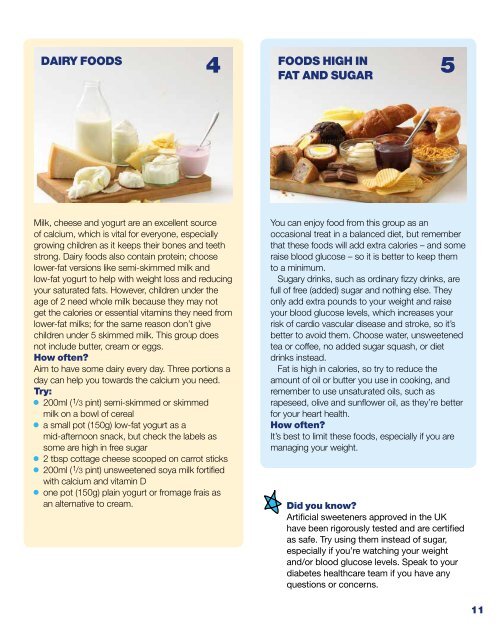Enjoy food
9f7d301hoGi
9f7d301hoGi
Create successful ePaper yourself
Turn your PDF publications into a flip-book with our unique Google optimized e-Paper software.
DAIRY FOODS<br />
4 5<br />
FOODS HIGH IN<br />
FAT AND SUGAR<br />
Milk, cheese and yogurt are an excellent source<br />
of calcium, which is vital for everyone, especially<br />
growing children as it keeps their bones and teeth<br />
strong. Dairy <strong>food</strong>s also contain protein; choose<br />
lower-fat versions like semi-skimmed milk and<br />
low-fat yogurt to help with weight loss and reducing<br />
your saturated fats. However, children under the<br />
age of 2 need whole milk because they may not<br />
get the calories or essential vitamins they need from<br />
lower-fat milks; for the same reason don’t give<br />
children under 5 skimmed milk. This group does<br />
not include butter, cream or eggs.<br />
How often?<br />
Aim to have some dairy every day. Three portions a<br />
day can help you towards the calcium you need.<br />
Try:<br />
• 200ml ( 1 /3 pint) semi-skimmed or skimmed<br />
milk on a bowl of cereal<br />
• a small pot (150g) low-fat yogurt as a<br />
mid-afternoon snack, but check the labels as<br />
some are high in free sugar<br />
• 2 tbsp cottage cheese scooped on carrot sticks<br />
• 200ml ( 1 /3 pint) unsweetened soya milk fortified<br />
with calcium and vitamin D<br />
• one pot (150g) plain yogurt or fromage frais as<br />
an alternative to cream.<br />
You can enjoy <strong>food</strong> from this group as an<br />
occasional treat in a balanced diet, but remember<br />
that these <strong>food</strong>s will add extra calories – and some<br />
raise blood glucose – so it is better to keep them<br />
to a minimum.<br />
Sugary drinks, such as ordinary fizzy drinks, are<br />
full of free (added) sugar and nothing else. They<br />
only add extra pounds to your weight and raise<br />
your blood glucose levels, which increases your<br />
risk of cardio vascular disease and stroke, so it’s<br />
better to avoid them. Choose water, unsweetened<br />
tea or coffee, no added sugar squash, or diet<br />
drinks instead.<br />
Fat is high in calories, so try to reduce the<br />
amount of oil or butter you use in cooking, and<br />
remember to use unsaturated oils, such as<br />
rapeseed, olive and sunflower oil, as they’re better<br />
for your heart health.<br />
How often?<br />
It’s best to limit these <strong>food</strong>s, especially if you are<br />
managing your weight.<br />
Did you know?<br />
Artificial sweeteners approved in the UK<br />
have been rigorously tested and are certified<br />
as safe. Try using them instead of sugar,<br />
especially if you’re watching your weight<br />
and/or blood glucose levels. Speak to your<br />
diabetes healthcare team if you have any<br />
questions or concerns.<br />
11


